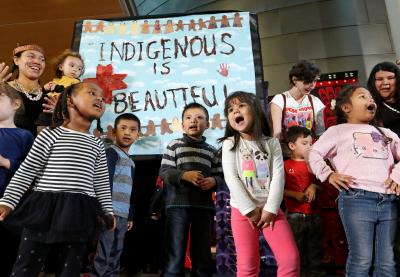"In 1492, Columbus sailed the ocean blue. He had three ships. He left from Spain. He sailed through sunlight, wind and rain."
We all know this rhyme, having learned it in elementary school. We also know it celebrates a man who literally was lost. It’s time for this to stop. It’s time to reconsider Columbus Day.*
Columbus Day is the wrong story, a story that injures all of us with its focus on a disoriented European. A better story—and better point of focus—is one that celebrates indigenous peoples who not only pre-date Columbus, but who persist and excel in an often hostile U.S. social and political environment.
Teachers have the power to change the practice of celebrating Columbus to a practice of celebrating indigenous peoples’ presence, endurance and accomplishments. Dozens of U.S. cities and the entire states of South Dakota, Hawaii, Vermont, Minnesota and Alaska now celebrate some version of “Indigenous Peoples Day” instead of Columbus Day. There’s even a Wikipedia page describing the holiday designation.
While many schools across the United States will be closed on Monday for the federally recognized honoring of Columbus, a growing number of states do not observe this holiday.
It’s clear that the story of the indigenous peoples affected by Columbus—and the colonizers who followed him—is gaining traction in local and state governments, as it should. But teachers also play a crucial role in highlighting that story in a deeper way. Regardless of where your school is located, consider engaging your students in a different story leading up to Columbus Day with one of the following activities:
- Read the story of Columbus from indigenous and Western perspectives to help students understand that historical events have more than one side. Possible Native-authored texts include the comic book The 500 Years of Resistance by Gord Hill (grades 9-12) and Rethinking Schools’ Rethinking Columbus: The Next 500 Years, which includes lesson ideas that can be adapted for any grade level, historical documents and creative works. These resources all help replace the “murky legends” with a celebration of indigenous survival.
- Read about indigenous experiences related to colonization beyond the arrival of Columbus. “Connected to Everything” is great for elementary students. You can find middle and high school readings in TT's Student Text Library. “The First Americans,” “Sure You Can Ask Me a Personal Question” and “Proclamation: To the Great White Father (November, 1969)” are a few examples.
- Conduct a mock trial of Columbus. “You Are There: The Mock Trial of Christopher Columbus,” accessible through the Education Resources Information Center (ERIC) database, “asks students in grades 6-12 to evaluate statements drawn from primary and secondary sources to determine whether or not Columbus should be found guilty of crimes against humanity.”
- For younger grades, read Thomas King’s A Coyote Columbus Story. This book, recommended by critics Jean Mendoza and Debbie Reese, introduces young readers to the role Columbus played in Indigenous enslavement. The text is particularly notable for its age-appropriate approach and its refusal to erase Indigenous peoples.
- Have students write letters to the town council or mayor detailing their concerns about honoring Columbus and considerations for honoring the cultures and contributions of indigenous communities in your region. The Persuasive Letters (grades 3-5) and Truth to Power: Writing Letters for Change (grades 6-12) activities in Perspectives are excellent ways to connect class readings and discussions with action.
- Introduce older students to contemporary indigenous practitioners and perspectives such as Drezus, the comedy troupe The 1491s, the documentary Moccasins and Microphones: Modern Native Storytelling through Performance Poetry and Adrienne Keene’s blog, “Native Appropriations.” You can even ask students to tweet on October 12 to these practitioners (or tweet references to their work) as a public antidote to the celebration of Columbus.
Thomas King writes in The Truth About Stories that “stories are medicine” and have the power to injure or heal. Observing a holiday in honor of Columbus and his exploits sends the wrong message. More important, it hurts Native Americans by reinforcing their absence from our national consciousness and hurts those who aren’t Native by lauding the arrival of a European instead of the more impressive healing story of indigenous survival. The indigenous story is more accurate, and it’s a story that students deserve to hear.
If stories are medicine, then the doctor is in. The prescription: Write and speak a healing narrative that honors Native peoples.
Additional Resources
- "Columbus Day or Indigenous Peoples Day?" a lesson from the Anti-Defamation League
- "Un-Columbus Day," 10 instructional tips from Teaching Channel
*Note: Although the website associated with the “Reconsider Columbus Day” video no longer exists, the video and its message remain powerful and persuasive.
Morris teaches writing and Native American/Indigenous Rhetorics at Kutztown University of Pennsylvania.
Editor’s Note: This short article was updated in 2019 based on reader feedback to include A Coyote Columbus Story.
